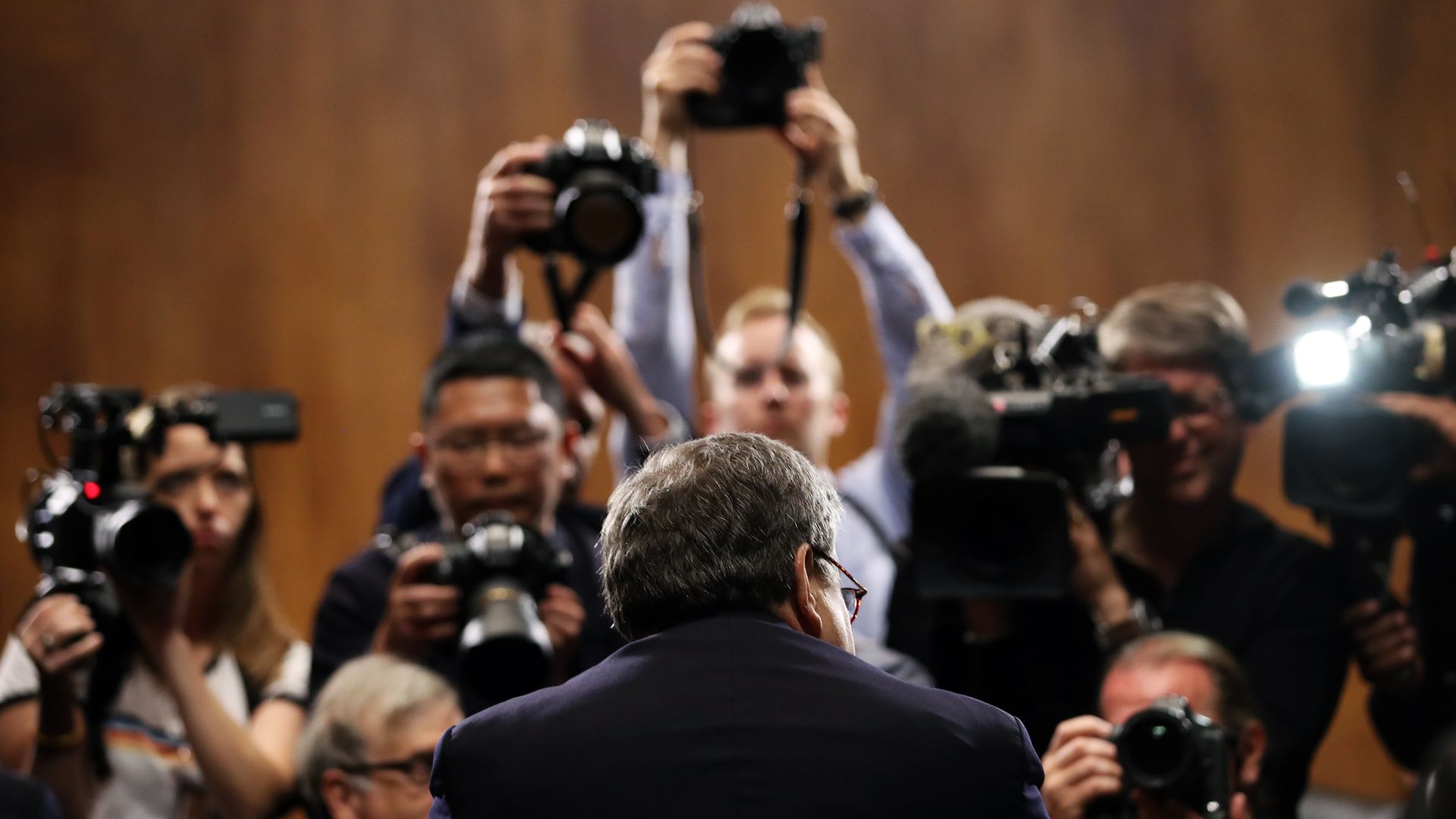Recap: AG Bill Barr's Senate testimony on the Mueller report
Add Axios as your preferred source to
see more of our stories on Google.

Attorney General Bill Barr. Photo: Win McNamee/Getty Images
Attorney General Bill Barr is testifying before the Senate Judiciary Committee about special counsel Robert Mueller's report into Russian interference in the 2016 election — a day after it was revealed that Mueller sent him a letter objecting to his March 24 characterization of the report's findings.
Catch up quick: Barr told Sen. Chuck Grassley (R-Iowa) that if Mueller felt as if he could not make a prosecutorial decision on the question of obstruction of justice, then he "shouldn't have investigated it. That was the time to pull up." When pressed on his March 24 letter clearing Trump of obstruction, Barr said: "I didn't exonerate. I said that we did not believe there was sufficient evidence to establish an obstruction offense, which is the job of the Justice Department."
Highlights
On the process of releasing the report:
- Barr said that he told Mueller in a phone call that he "wasn't interested" in putting out the special counsel's prepared summaries in a "piecemeal" fashion, despite Mueller's requests.
- Barr said he has no objections to Mueller testifying, but that it's up to Trump to decide whether McGahn should testify. Barr said there are legitimate objections Trump can make to prevent McGahn from testifying.
- Responding to a line of questioning from Sen. Kamala Harris (D-Calif.) about his decision that Mueller's evidence was "not sufficient to establish that the president committed an obstruction of justice offense," Barr admits that he has not personally reviewed all of the evidence.
- Barr said Mueller's letter is "a bit snitty" and was "probably written by one of his staff people." Asked by Sen. Richard Blumenthal (D-Conn.) whether the committee could get the memo of Barr's phone call with Mueller, Barr replied: "No. Why should you?"
On the obstruction ruling:
- Barr explained that he decided to clear President Trump on obstruction of justice because the government would not be able to establish "corrupt intent" beyond a reasonable doubt.
- Responding to the episode in which Trump directed White House counsel Don McGahn to remove Mueller due to conflicts of interest, Barr argued that Trump truly believed Mueller was conflicted and that "remove," which he said is different than "fire," implies that a new special counsel would be appointed.
- Barr told Sen. Chuck Grassley that if Mueller felt as if he could not make a prosecutorial decision on the question of obstruction of justice, then he "shouldn't have investigated it. That was the time to pull up."
- Barr told Sen. Patrick Leahy (D-VT) that Trump "fully cooperated" with the investigation. Trump never submitted to an in-person interview and multiple episodes in the Mueller report suggest that Trump tried to get Mueller removed.
- Barr told Sen. Amy Klobuchar (D-Minn.) that Trump's statements implying Michael Cohen's family members committed crimes in order to influence Cohen's testimony could not "pass muster" to reach the level of obstruction.
- On his decision to clear Trump on obstruction, Barr said: "I didn't exonerate. I said that we did not believe there was sufficient evidence to establish an obstruction offense, which is the job of the Justice Department."
Other highlights
- When asked if he has ever used the term "spying" to refer to authorized department investigative activities, Barr said: "I'm not going to abjure the use of the word 'spying.' My first job was in CIA. I don't think it has a pejorative connotation at all. To me the question is always whether or not it's authorized and adequately predicated spying. I think spying is a good English word that, in fact, doesn't have synonyms, because it is the broadest word, incorporating all forms of convert intelligence collection. So I'm not going to back off the word spying except I will say I'm not suggesting any pejorative and I use it frequently, as do media."
- Barr continued: "We went back and looked at press usage, and up until all the faux outrage a couple of weeks ago, it's commonly used in the press to refer to authorized activities." Sen. Sheldon Whitehouse (D-R.I.) responded: "But it's not commonly used by the department," to which Barr replied: "Well, it's commonly used by me."
- After saying earlier in the hearing that he "can't fathom" why the FBI did not give the Trump campaign a defense briefing that Russia was targeting them, Barr said: "I have been told during the break that a lesser kind of briefing, a security briefing that generally discusses general threats, apparently was given to the campaign in August."
- Pressed by Sen. Mazie Hirono (D-Hawaii) to answer whether Trump lied, which the Mueller report said he did, Barr said: "I'm not in the business of determining when lies are told to the American people. I'm in the business of determining whether a crime has been committed."
- Barr told Sen. Cory Booker (D-N.J.) that he's not sure what he means when he says the Trump campaign "sought to benefit" from material stolen by Russians. When told the campaign shared polling data with a foreign adversary, Barr replied: "With who?"
- Asked whether Mueller reviewed Trump's tax returns, Barr said he does not know. He told Sen. Klobuchar that she can ask Mueller when he testifies.
- Barr said that there are "multiple criminal leak investigations underway" related to the media's coverage of the Russia investigation.
Go deeper: Lindsey Graham says he won't bring Mueller before committee
